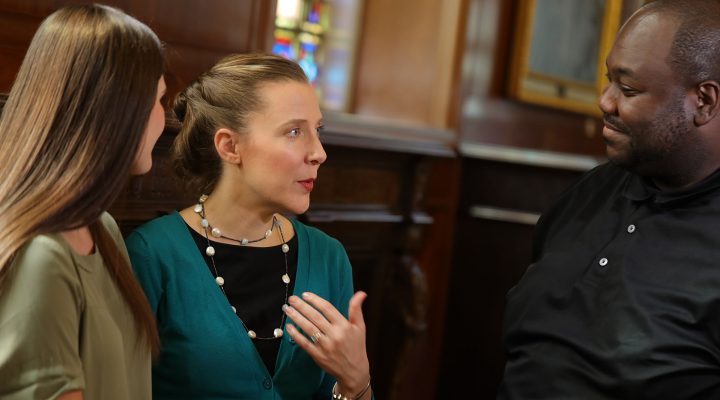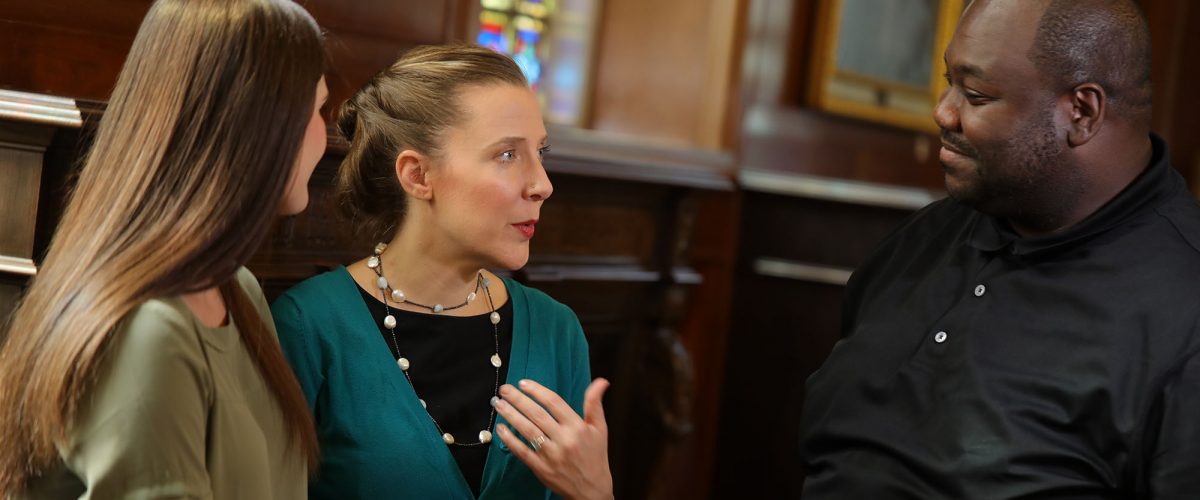Baylor University’s Religion Department is not your grandparents’ or your parents’ religion department. It’s not even the religion department it was just a decade ago.
It has changed dramatically in faculty and academic direction, featuring a wide diversity of educators and researchers exploring the history of the Baptist movement from its many angles and corners as well as the state of the denomination and Christianity in the world today.
As of early 2024, Baylor’s religion department had 32 full-time faculty members as well as some adjuncts and graduate students who teach in the fifth year of their programs. It has grown from a department mostly led by white Baptist men to a department encompassing men and women who are white, Hispanic and Black, and Baptist but also other denominations.
“We have a large department. There’s still a strong majority of Baptists on the faculty. Nevertheless, we’re a department with an ecumenical spirit with no doubt,” said Doug Weaver, a full professor who joined the faculty in 2003 and has chaired the department since 2021.
Weaver is talking about the fact that while all the department’s faculty are affiliated with and active in Christian churches, as is required, 25% are not Baptist. Twenty-one are male and 11 are female; 24 are white and eight are people of color.
“The number of women faculty have increased. We’re still very sensitive to that. But our people of color have increased as well,” he said. “In the history of Christianity area, you see those values. We’re certainly committed to Baptist identity, but we’re trying to demonstrate that the Baptist tradition has multiple voices. It does not just have one.”
“We’re trying to demonstrate that the Baptist tradition has multiple voices. It does not just have one.”
The diversity of the department in many ways mirrors the increasing diversity of Baylor’s student body. According to official university statistics, of the 3,317 new freshmen enrolled in fall 2023, 36.5% were minority students. Of the 20,824 total enrollment (15,155 undergraduate and 5,669 graduate/professional), 60% are from Texas, but Baylor students also come from all 50 states and 100 foreign countries. According to collegefactual.com, Baylor’s student population is 60% women and 40% men.
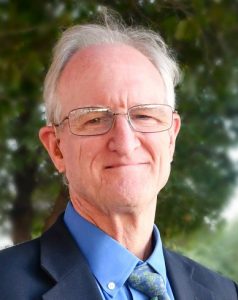
Doug Weaver
A census of the entire university is important because all Baylor students are required to take two courses in the religion department: “The Christian Scriptures” and “The Christian Heritage.” As such, in 2022-23 the religion department had 6,837 students enrolled in religion courses. Of those, about 120 were religion majors and 240 were religion minors, according to Weaver.
“Majors have been between 110 and 130 for over a decade, so that is stability in an area not known for it in recent years,” he said, adding that 65% of undergraduate religion majors are female. “We are consistently over 50% women in our religion majors.”
Drilling a little deeper into the religion major population, for the 2023-2024 academic year, 204 were approved for Baptist General Convention of Texas Ministry Scholarships and 265 for Baylor Ministry Scholarships. Of the latter group, 61 students are from churches not affiliated with the BGCT.
Diverse Baptist perspectives
Within the growing diversity of Baylor’s religion department has been a broadening of the focus on Baptist history.
Weaver, who wrote the textbook used in Baylor’s Christian heritage classes and teaches “History of the Baptists” at the undergraduate level and a doctoral level Baptist studies seminar, points to Joe Coker, senior lecturer, who is the journal editor for the Baptist History and Heritage Society, and Mandy McMichael, associate director of the department’s Ministry Guidance program, who writes on Baptist women and is writing a book on Helen Barrett Montgomery, an early female leader among American Baptists.
“We really do think we have the strongest focus (on Baptists and Baptist history among Baptist institutions), and we provide this work not only at the undergrad level, but at the Ph.D. level,” Weaver said. “We really are trying to show that Baptists don’t just have one voice, because, as you know, in the media, people think that there’s just one voice.”
Among the recent hires Weaver noted as broadening that conversation are Elizabeth Flowers, Adam Bond and João Chavez.
“There clearly has been, I would call it, a balance,” Weaver said. “We clearly have wanted to show that there are multiple Baptist voices out there, and these hires have helped. And it balances out that the department is also committed to the broader Christian conversations.”
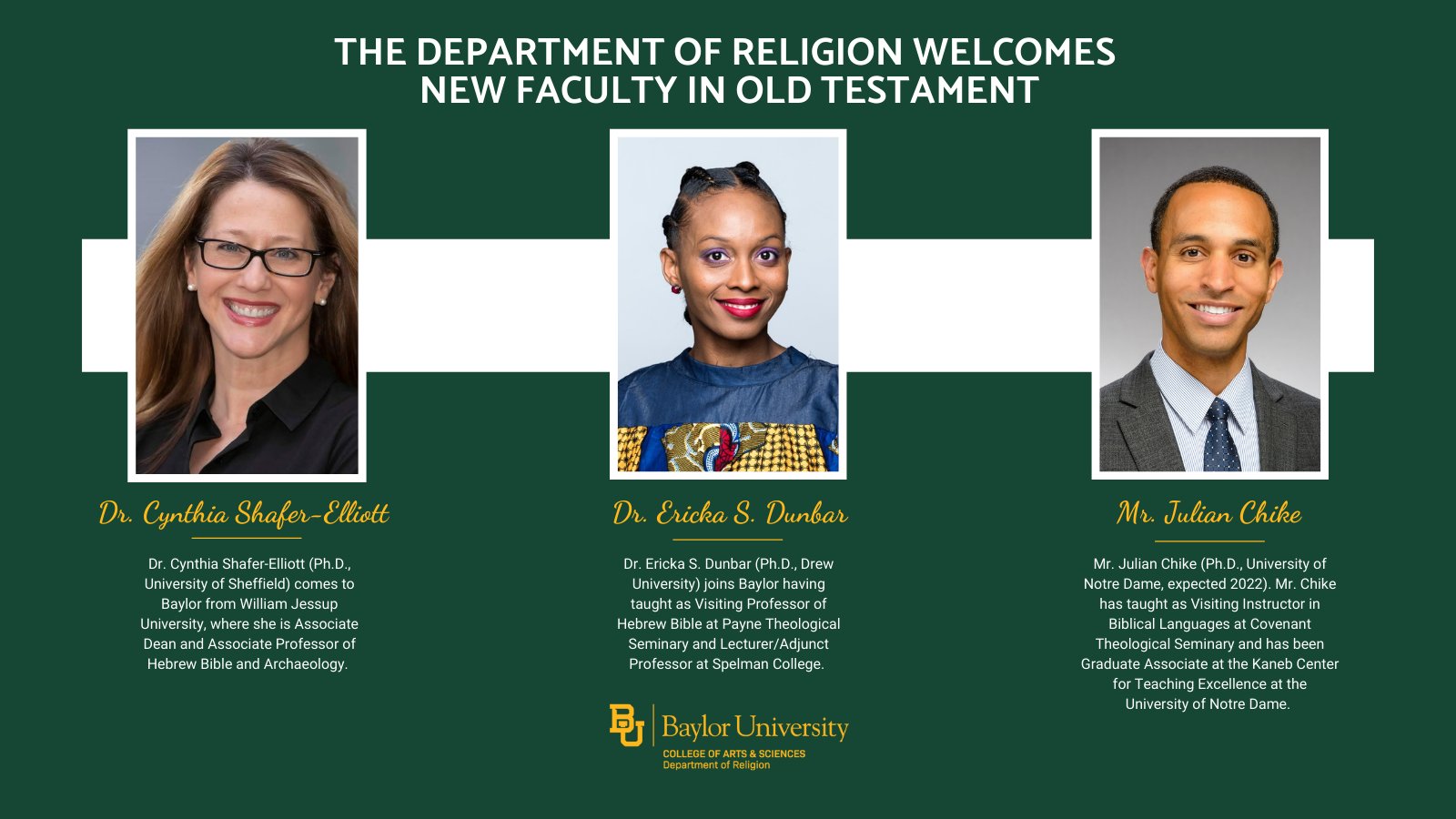
Giving voice to Baptist women
Elizabeth Flowers, associate professor of American religion, joined Baylor’s religion faculty in 2019 after a 13-year tenure at Texas Christian University where she distinguished herself in the classroom but also in research and writing. Her book, Into the Pulpit: Southern Baptist Women and Power Since World War II, published in 2014, is described by Weaver as “the most groundbreaking book on women in Baptist life in the last 50 years.”
Flowers, a lifelong Baptist who never attended or taught at a Baptist college or university before coming to Baylor, said she wrote the book not as a Baptist woman but as an American religious historian.
“Those who had conservative ideas about gender often then saw themselves as inerrantist.”
“I did feel that most of the work and analysis that had been done on the SBC battles had looked at questions of inerrancy, and I think gender and the issue of women was driving many of the questions around inerrancy,” she said. “In some sense (gender) was a test case, but I think probably it was more than a test case. I think the two were inextricable; they were entangled. Those who had conservative ideas about gender often then saw themselves as inerrantist. It’s sort of a ‘which came first,’ but it was more than that too.”
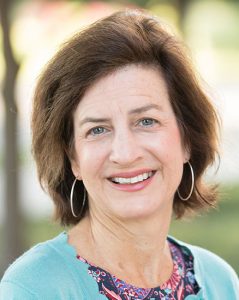
Elizabeth Flowers
Flowers said when she first heard about an opening at Baylor for someone to teach and research in the areas of women, gender, Baptist history and Christian history, she was intrigued.
“I was excited about what they were doing in the graduate program. I was excited about their seeming commitment to the study of women and gender in progressive ways, commitment to a Christianity interfaith dialogue,” she said. “I found the department itself theologically and ideologically stood in a place where I felt comfortable, represented where I was, but also there were some challenges I thought would be exciting to undertake.”
One of the challenges she thought she might encounter — continuing her research on Baptist women — was quickly dispelled.
“I was working on the outside (at TCU) and I didn’t know if that could happen working on the inside,” she said. “And I was convinced, after being here and talking to faculty and administrators, that not only could it happen, but this is the place where it should happen. There was a real commitment to, ‘We want this to happen here. This is the place where these conversations should be taking place. And we want to create spaces for this conversation. And how could we support and help you in promoting these conversations and pushing forward?’ That was sort of astounding to me, and in some ways I just couldn’t say no to that.”
Flowers added that within the Baylor religion faculty, “I have conversation partners here I didn’t have elsewhere within the Baptist world. And just within the scholarly world, there is an expertise and a knowledge base and a commitment and an interest and an excitement here.”
She also found Baylor’s Religion Department was “moving” in directions that were intriguing and positive.
“There’s a delicate balance between maintaining that historic Baptist sense of identity, reimagining who Baptists are and then including other voices, and all three things were happening and are happening,” she said. “It’s not just the old SBC.”
“I have conversation partners here I didn’t have elsewhere within the Baptist world.”
This semester, Flowers is teaching a course on women in religion, and she also teaches graduate courses “that look at issues of women, gender and sexuality in American religion, particularly evangelicalism, and sometimes from a global perspective as well.”
She frequently teaches “The Christian Heritage,” which along with “The Christian Scriptures” is a required course for all Baylor students.
“Students are often surprised to realize Christianity has a history, but once they get over the surprise that Christianity looks different in different times and places, then it’s a journey they’re fairly willing to join me on,” she said.
In addition to Into the Pulpit, Flowers is coauthor of A Marginal Majority: Women, Gender, and a Reimagining of Southern Baptists published in 2020. She has been active in leadership of the American Society of Church History and the Southwest Region of the American Academy of Religion.
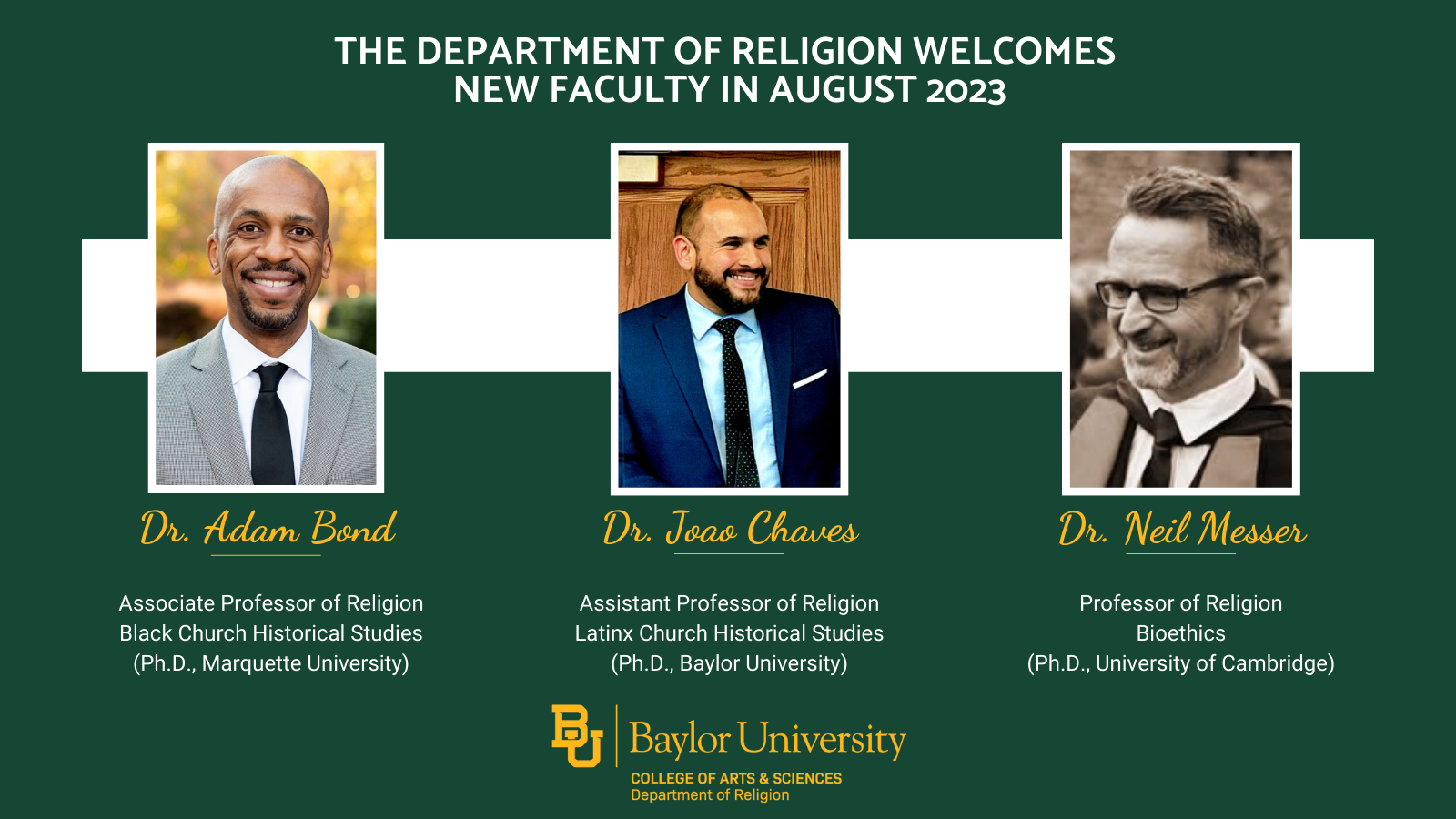
Telling the African American story
Adam Bond, associate professor of religion and African American studies, joined the faculty last summer from Virginia, where he was pastor of the historic Ebenezer Baptist Church in Richmond. He is a historian of Christianity in the United States with research and writing focusing on the “narratives and ideas” of Black Christian leaders of the 19th and 20th centuries.
“What I see in terms of the department’s recent hires has been a real commitment to this notion that the Baptist story is much richer, much more complex, much larger than how it is being told in contemporary scholarship,” he said.
Bond is an ordained minister in the American Baptist Churches USA and has authored and edited several books on faith and leadership. He is working on a history of African American Baptists titled Read the Text First: Black Baptist Leaders, Race Literature, and the Salvation of America, which he said looks at the voices that were prevalent before Martin Luther King Jr. became a national presence.
“I’m highlighting the voices of his intellectual, religious and theological precursors, as well as thinking about people who are also doing good work in their own ways; who are helping us understand that there’s not just one way of being Black and Baptist in America,” Bond said.
“I believe I’m carving out a path in terms of scholarship that reflects a different are different area than where most people have paid attention in the Baptist story.”
He continued: “I’ll begin to pay attention as well to African American Baptists who were committed to the Social Gospel trajectory in terms of heavily influenced by not only Walter Rauschenbusch, but persons such as Howard Thurman and Benjamin Mays. I believe I’m carving out a path in terms of scholarship that reflects a different area than where most people have paid attention in the Baptist story.”
This spring, Bond has designed and is teaching a course titled “The Black Church in America,” which he described as “a history of both the idea, but also of the practices and beliefs of African American Christian congregations.” It includes the historical denominations that have been known as the Black denominations and churches in America: African Methodist Episcopal, Christian Methodist Episcopal, AME Zion Church, as well as the Church of God and Christ and the Black Catholic church.
“That is for upper-level undergraduates,” he said. “For graduate students, I’ll develop a version of that course as well, but I’m thinking about courses such as ‘The Social Gospel,’ as well as a course eventually on revivals in America.”
Weaver noted Bond will help coordinate, as a member of the department’s Baptist Identity Committee established in 2022, a new James Melvin Washington Research Grant in Black Baptist history.
“Washington was the leading Black Baptist historian of the latter part of the 20th century,” Weaver said. “It will be a travel grant for researchers in Black Baptist history.”
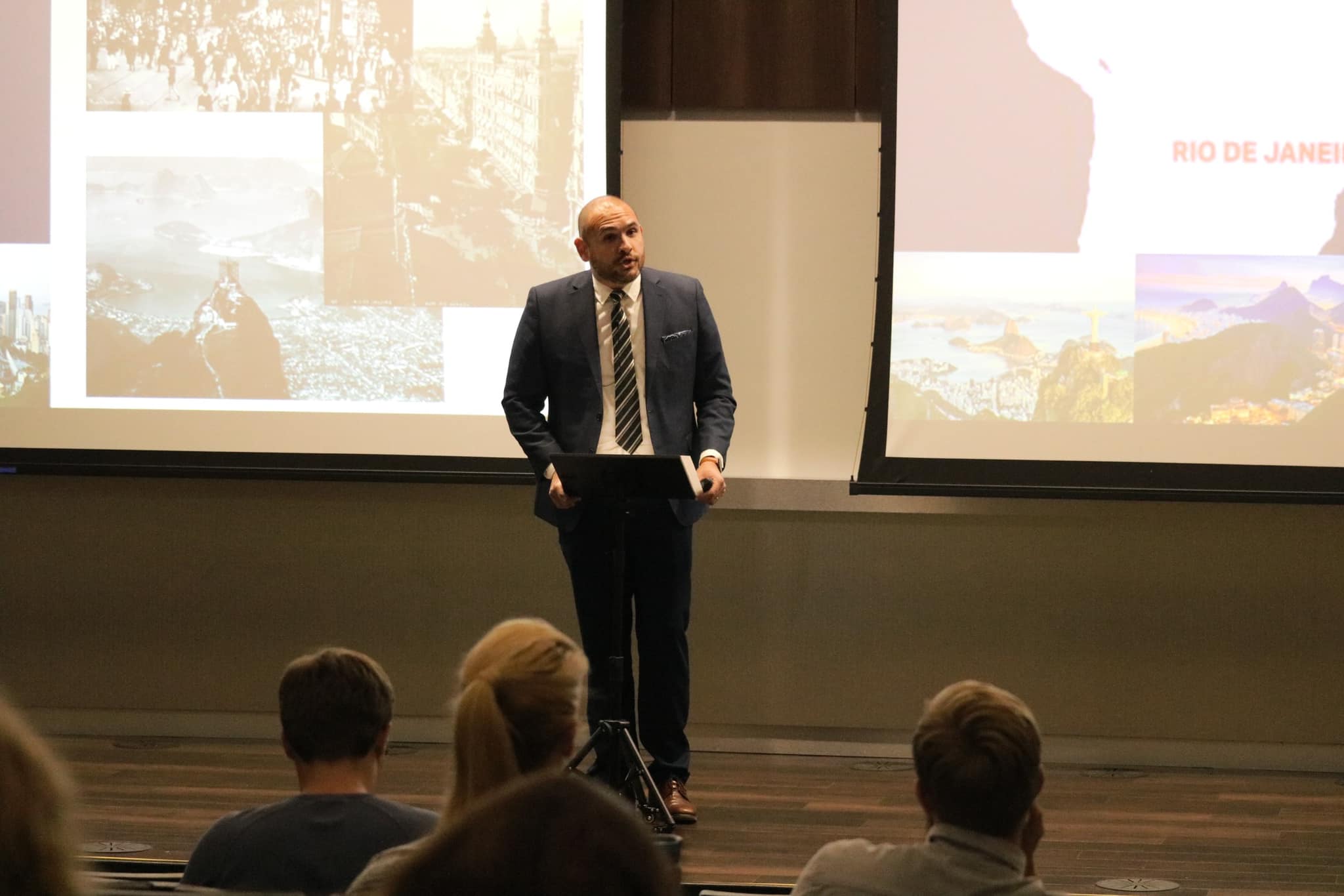
João Chaves teaching. (Baylor photo)
Latin American voices
Among the newest faculty in Baylor’s religion department, João Chaves is what Weaver called a “rare” hire. Universities don’t often hire their own graduates and instead look for new and different voices, he explained. But Chaves, who is from Brazil, offers just such a new and different voice.
“It is extremely rare for us to hire one of our own into a tenure-track spot, and we did that with him. That’s how highly we think of him,” Weaver said. “He does Baptists in Brazil and he does Baptists and immigration. He does Baptists in the context of world Christianity.”
Chaves, assistant professor of the history of religion in the Americas and co-director of the Baptist Scholars International Roundtable, said when he was a doctoral student at Baylor from 2012 to 2017, the department did not have a strong focus on Latin American scholars, but he has been watching the department and saw that changing.
“As soon as I left, my colleague Carlos Cardoza-Orlandi, a Puerto Rican scholar who focuses on world Christianity with a look at the Caribbean specifically, joined; (he’s) someone that is a strong voice in the field of world Christianity,” Chaves said. “So, as a graduate following the trajectory of the department in terms of the faculty hires they were making, it was pretty clear to me they were invested in building the kind of environment I would like to be a part of.”
Chaves came to Baylor from simultaneous posts: assistant professor of evangelism and mission at Austin Presbyterian Theological Seminary and director of the Hispanic Theological Initiative at Princeton Theological Seminary. He said while the research and scholarship he is interested in could be pursued from other institutions, Baylor offered a broader platform.
“As a matter of fact, I used to joke it was not always a bad thing that I was Baptist doing research on Baptists but having my salary paid by the Presbyterians, because one often gets involved in some denominational politics from the inside that might feel a certain way that it doesn’t when you do it from the outside institutionally,” he explained. “That said, the kind of dialogue partners I have here doing cutting edge scholarship on Baptist studies — I cannot imagine another place in the world to do it.”
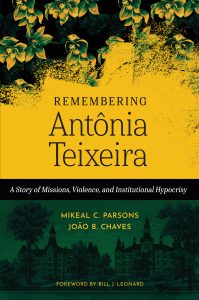 Chaves’ teaching and research focuses on U.S.-Latin America religious networks and the kind of geopolitical spaces that come out of those connections. He said this broader study of Baptist history both nationally and internationally is especially timely now.
Chaves’ teaching and research focuses on U.S.-Latin America religious networks and the kind of geopolitical spaces that come out of those connections. He said this broader study of Baptist history both nationally and internationally is especially timely now.
“In a world that continues to be more and more polarized, and in which religious communities, particularly Protestant communities, particularly Baptist communities, are part of increasing the kind of polarization in the kind of politics that are detrimental to marginalized communities, it is important for us to tell honest stories about the shortcomings of those particular dispositions, so we can have a better self-perception that ideally will open room for honest conversations about who we really have been, so we can hopefully get to address some of these problematic connections we have,” he said.
Chaves has authored six books, including Remembering Antônia Teixeira: A Story of Missions, Violence, and Institutional Hypocrisy, which was published in 2023 and co-authored with Baylor’s Mikeal Parsons. The book details what Chaves calls the “transnational” cover-up of the rape and ongoing assaults of Teixeira, a Baylor student from Brazil, by Steen Morris, both who were guests in the home of then-Baylor President Rufus Burleson. Chaves said the cover-up was instigated to protect “the narratives of institutional goodness” of both missionary agencies and Christian universities.
“The narratives of institutional goodness often go hand in hand with the continuing erasing and oppression of people in the margins that these communities or these institutions often mistreat in different ways,” he said. “That is not to say there are only bad things to talk about in our history, in our heritage, but it is to say the historical selectivity these Christian institutions continue to engage in, to tell about who they are, I think is what allows them to disseminate ideologies that are not necessarily productive, especially in a world, again, that continues to become polarized and in which some of our Baptist communities, and I talk about Brazil but also the U.S., continue to have major voices in extremist and authoritarian conservatism that I don’t think line up with the best that we can be.”
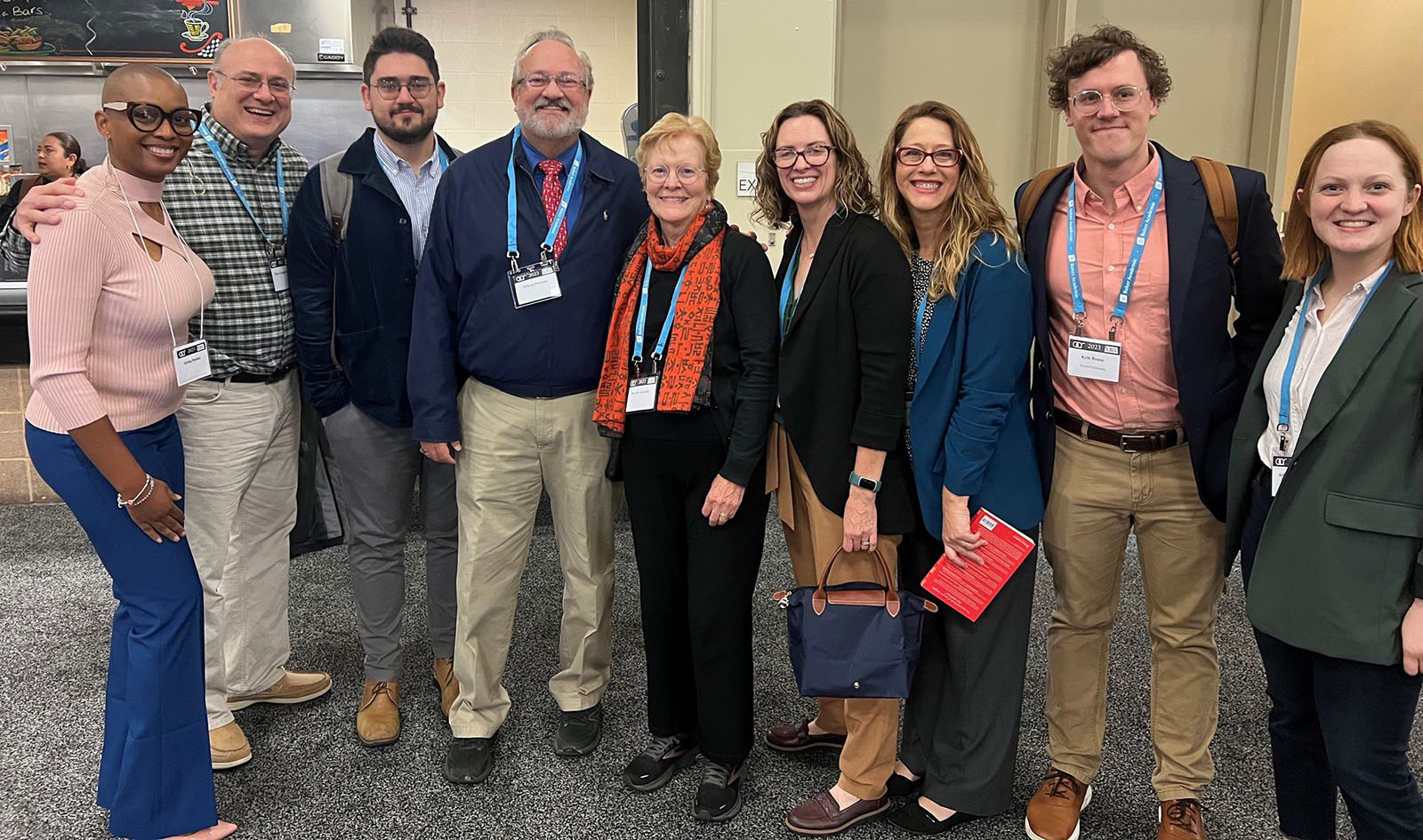
Baylor faculty and graduate students at the annual meeting of the American Academy of Religion and the Society of Biblical Literature in November (Facebook)
Looking back, looking ahead
Mikeal Parsons, who co-wrote the book on Antônia Teixeira with Chaves, probably knows better than anyone else how far Baylor’s Religion Department has come. Parsons, who in 2023 was named Baylor’s first-ever University Distinguished Professor, has been at Baylor since 1986 and is the longest-tenured faculty in the department.
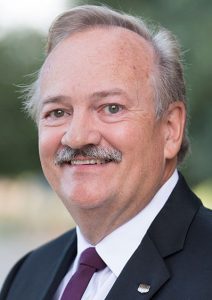
Miikeal Parsons
“I would say in the last decade, there’s been a concerted effort to bring in diverse Baptist voices,” he said. “We had a great faculty in 1986, and through the years I’ve enjoyed all of my colleagues, but I really think the faculty has never been stronger, in part because it’s never been more diverse.”
That diversity includes personal backgrounds and educational experiences that are not just Baptist.
“If you want to have a full-blown and full-world educational experience, then it ought to reflect the world in which we live. And the faculty I joined in ’86, even though it was an excellent faculty, did not reflect that world,” Parsons said. “We have folks on our faculty with degrees from Princeton, from Duke, from Emory, Drew, so that kind of diversity of perspective has been important. And of course, along with the diversity of perspective has come a diversity in geographic distribution, ethnicity, race, gender. And particularly in the area of Baptist history, we’ve made some very significant appointments.”
The commitment to study Baptist history has become more important in the aftermath of “the takeover or the change or whatever,” said Parsons, referring to when fundamentalists took control of the Southern Baptist Convention in the 1980s.
“Baylor became a place where those kind of important Baptist distinctives were and have been preserved.”
“A lot of the cherished historic Baptist principles were basically set aside: separation of church and state, freedom of conscience, religious liberty. Those things basically were viewed as being shibboleths that belong to a bygone age,” he said. “I think the department here was very concerned that those distinctives not be lost institutionally, and Baylor became a place where those kind of important Baptist distinctives were and have been preserved.”
More broadly, Parsons believes those distinctives are needed now more than ever.
“We’re not trying to keep alive an old something that may pass away. These distinctives, however they manifest themselves, are pretty important these days,” he said. “They’re an important part of the democracy that has itself been threatened. And the Baptist tradition of dissent, where one speaks against the injustices of society whether they’re government inspired or otherwise, is an important Baptist principle that needs to be preserved, in my opinion.”
New directions for research
Baylor was designated a Research 1/Tier 1 institution in late 2021, and while that is often associated with science, technology, engineering and math departments, Weaver said humanities and religion have been significant contributors to the designation.
“This might sound kind of heady, but we’ve said on campus that we were Tier 1 before the university was talking about Tier 1,” he said. “And what we mean by that is we have had people writing books and doing research for a long time. And I do think that’s accurate when you look across the board at all our areas. There is a lot of scholarly productivity, just even in New Testament. I think the university acknowledges that research is done well in the Religion Department.”
One area of the department Weaver said is already contributing to research but will become even stronger is bioethics.
“For the longest time, maybe one person in the department would try to teach a bioethics class, but it has become a significant focus of who we are,” he explained.
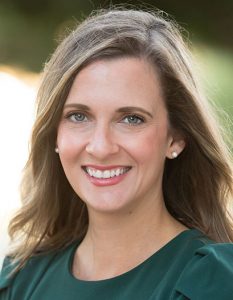
Devan Stahl
Devan Stahl, Baylor’s first bioethicist, joined the religion faculty in 2019. She is leading an interdisciplinary team that in 2022 was awarded a $2.5 million grant from the John Templeton Foundation “to explore how to tackle the complex problems of human flourishing by training theologians to incorporate the methods and insights of the psychological sciences into their work.”
A second bioethicist will join the department in August.
“In terms of scholarly productivity, we think the grant production with our new bioethicist is probably going to be notable,” Weaver predicted.
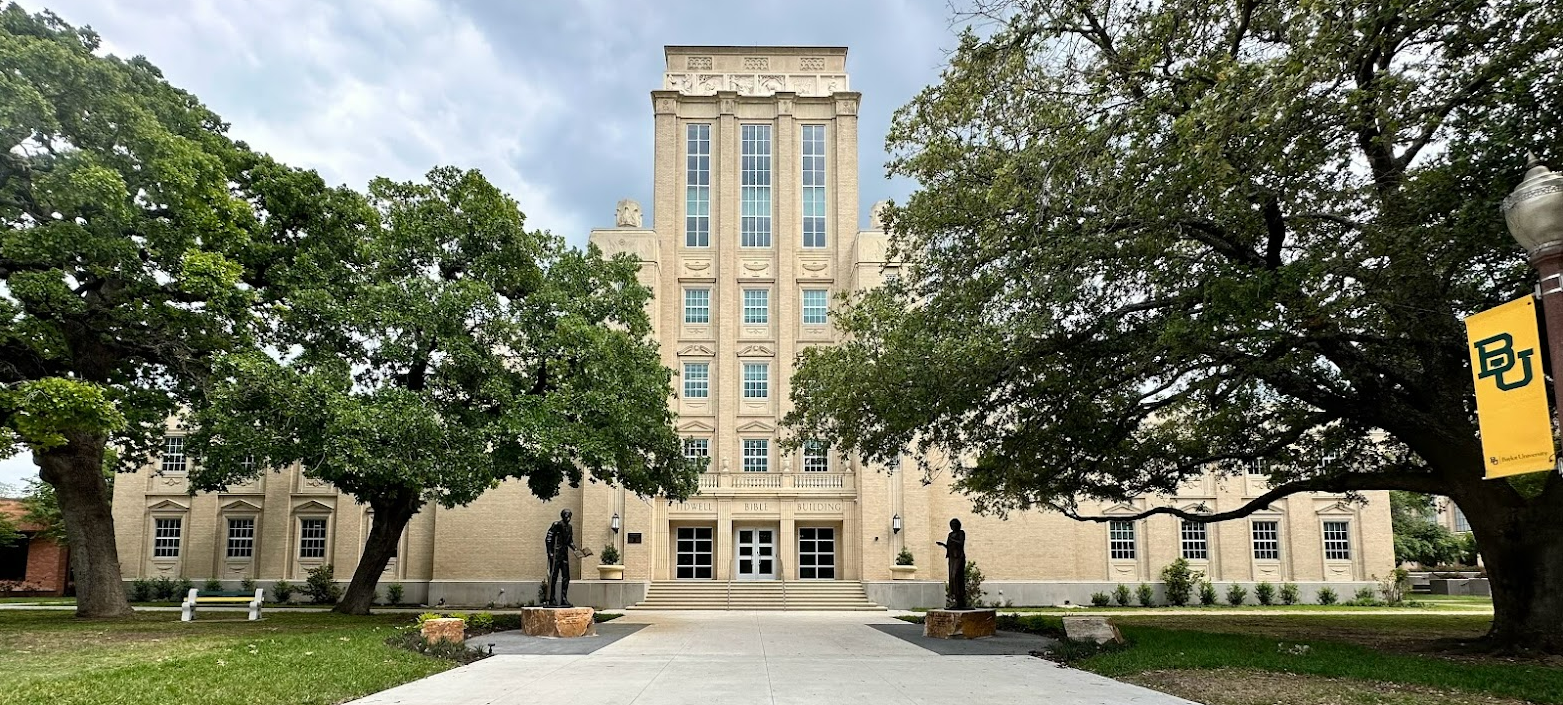
Tidwell Bible Building on Baylor’s campus (Baylor photo)
That old time religion
Lest anyone think Baylor’s religion department has turned away from traditional religion and scriptural studies to focus on Baptist history, social justice, bioethics and other cultural topics, Weaver said the department always has been and still is strong in biblical studies. The change in the two required courses — from “Old Testament” and “New Testament” to “The Christian Scriptures” and “The Christian Heritage” — recognizes the changing demographics and experiences of both faculty and students.
“It’s a recognition that the history of Christianity, the history of its practice, is not just first century, but it has 2,000 years of growth and development,” Weaver said. “It is a recognition that the whole story of Christianity is important. So, people who came to Baylor like you might go, ‘Did you all abandon the Bible?’ The answer to that is, ‘No, of course not.’ If anything, it’s more the only way to get students to talk about it.”
Another thing that hasn’t changed in Baylor’s Religion Department is the focus on Judaic-Christian faith groups. It’s a Baylor requirement that every faculty member is either Christian or Jewish, and in the Religion Department, that they be a practicing Christian.
“That would be different from, I assume, TCU or UT where I would think a person could be Muslim and teach in a religion faculty,” he said. “That’s not the case at Baylor. It does operate out of its historic Christian identity.”
That doesn’t mean Baylor religion faculty only teach Christian topics. There are courses looking at the intersection of Christianity and other religions.
“One thing you’re seeing in this decade of the 21st century is more focus on global engagement, without a doubt,” Weaver said. “We do have a faculty member who teaches world religions. That’s not traditionally been a large area in the department.”
Regardless of the topic or focus, excellent teaching is still held in high esteem.
“We still love teaching. We think we have great teachers in the department,” Weaver said. “That’s that old Baylor thing. I mean, was teaching going to go away when Baylor started emphasizing research? I think it’s always difficult to do everything well. You know, maybe that’s the old impossible ideal, but teaching is highly regarded in the department, and we have not lessened that commitment.”
Editor’s Note: Jeff Hampton was a student at Baylor from 1977 to 1981. He took the Old Testament and New Testament survey courses required of all students, and he took the History of Baptists course as part of a minor in American Studies. The religion faculty at that time comprised 13 white men.

